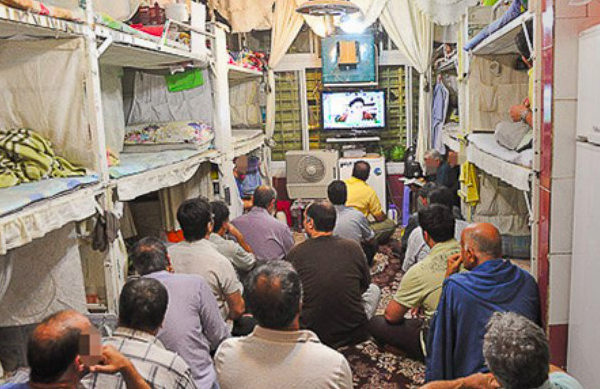Features

“Good afternoon, inmates. This afternoon’s programming is about to begin.”
Every day, around 11.30am, the voice of a presenter booms out of multiple television sets, bringing religious edification, entertainment and music – and, in contrast to Iranian state TV, often uncensored content – to inmates serving sentences at Iran’s best known and most notorious correctional facility, Evin Prison.
Evin Network programming begins with recitations from the Koran, followed by a feature film, such as Mission: Impossible – Ghost Protocol. Sometimes the movie is followed by a play staged by artists in Wards 7 and 8 of the prison. The broadcast usually concludes with music — two or three Iranian songs.
“When I first watched this channel it was by accident,” says an inmate called Rezvan. “I was in my solitary cell at Ward 2A and I was pleasantly surprised. It felt like they had injected new blood into my veins.”
When Rezvan first watched one of the prison channels — Evin is not the only prison with TV output — he was confused, as he was unsure of where he actually was because interrogators had led him around the prison blindfolded.
“When the announcer said ‘This is Martyr Koochoie Channel’ I thought I was at Koochoie Prison, but later I discovered that this is Evin Prison’s TV channel. I read about it in an issue of Ettela’at newspaper, which was thrown into my cell through the hatch. It reported that in recent years Islamic Republic of Iran Broadcasting (IRIB) has issued permits to Evin Prison and some other prisons in the country to set up and run their own TV channels.”
Only prisons with high inmate populations are offered their own television broadcasts. With close to 20,000 inmates, Ghezel Hesar in Karaj near Tehran is Iran’s biggest prison, and inmates are enthusiastic about taking part in the prison’s TV network. Evin’s channel is called Martyr Koochoie Channel, named after Mohammad Koochoie, the first head of Evin Prison following the Islamic Revolution. He was assassinated by the opposition group People’s Mojahedin in 1981. The Koochoie prison and army barracks in Karaj have been also named after him.
IRIB — also known by its less formal name, Sight & Sound — offers technical support to the Evin station, which broadcasts three hours of programming a day. The inmates, who are also the presenters, manage the broadcasts from a control room located in an area of the prison that offers cultural activities.
“Every day at noon on Ward 8 we switch our TVs from digital to analog antenna to receive the channel,” says an inmate named Jaber. “Its programs are better and more liberal than those offered on Iranian TV. There is less censorship and more music. I have even heard that people living near the prison can get a signal and watch movies on the channel. They prefer to watch Evin TV because it is rarely censored and foreign movies are shown in their original language. For example, just recently they aired a movie that had a Céline Dion song at the end and the song was broadcast in its entirety.” Under the Islamic Republic, solo songs by female singers are banned.
But M., an inmate at Ward 7, has a different opinion. “After small SD memory cards arrived and TVs were equipped with USB ports a couple of years ago, this channel began to lose its popularity,” he says. “The inmates prefer to watch the latest movies from around the world on their smartphones or TVs. They have a wider choice of movies and music and can watch them in high definition.”
Becoming More Professional
Near the entrance of Ward 390 at Rajaei Shahr Prison in Karaj, a sign announces “Prison’s Sight & Sound.”
The channel broadcasts from 10am to noon and from 2 to 4pm. Its programs include movies from around the world and Iranian TV series.
“I watched the [popular] Bitter Coffee TV series on the prison channel at the same time it was broadcast on national TV,” says Rahim, an inmate at Gohardasht Prison in Karaj. “Most inmates would gather around the TV to watch it. On Wednesdays the channel broadcasts both new music and old favorites — it’s very popular.”
According to Rahim, who has spent time in both Evin and Ghezel Hesar Prison in Karaj, the popularity of these prison channels continues, with increasing interest from some parts of the prison population. “The management and the production has become much more professional in the past couple of years,” he says. “Rajaei Shahr’s channel has its own logo and has been given a stylish building to operate from. On Wednesdays they broadcast songs, with videos if they are available. Usually they play songs by Iranian pop singers Benyamin Bahadori, Mohsen Chavoshi and Mohsen Yeganeh. But Morteza Pashaei [who died 2014], still has his faithful fans and the channel plays a lot of his songs.”
Like Jaber, Rahim has heard songs by foreign women solo artists played across the network. “Sometimes they don’t censor songs by female singers in foreign movies. They also play old, nostalgic songs. This gives the prisoners a chance to forget about prison walls for a short while.”